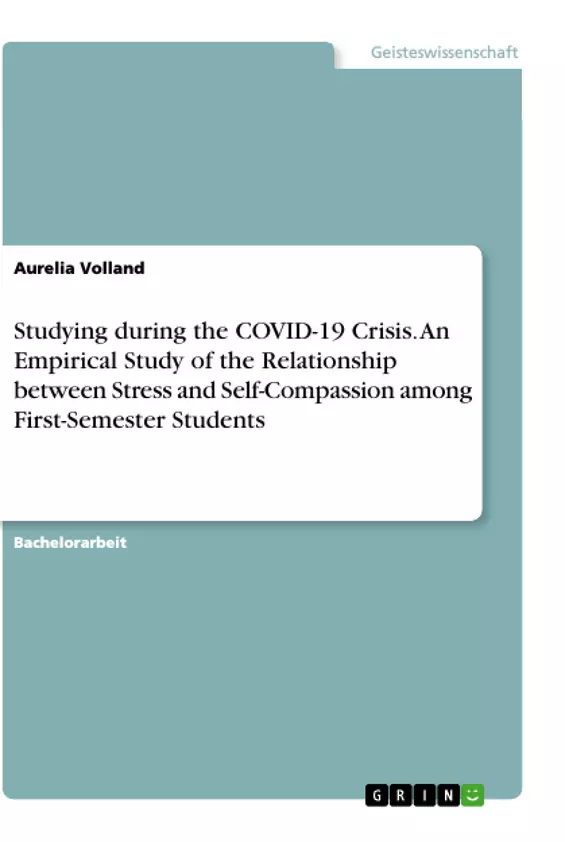The purpose of this work was to analyze the relationship between stress and selfcompassion. It will be highlighted what impact the restrictions due to the COVID-19 pandemic have on students specifically. In addition, the current state of research in light of COVID-19 will be presented and the five hypotheses based on the empirical background will be presented. A quantitative analysis in form of a questionnaire was used to obtain measurable values.
In the following thesis, the relationship between stress and self-compassion in freshmen will be examined. The key theoretical concepts, namely stress and self-compassion are defined and the popular theories regarding these two constructs are presented. The empirical section was conducted in form of a quantitative study of the relationship between self-compassion and stress on first-year students, with particular reference to the COVID-19 pandemic.
The results are then related to the current state of research, interpreted and discussed. Different options for universities and students are shown which can facilitate support measures for dealing with this extraordinary situation. Finally, the results are compared with the theories presented at the beginning and the differences and similarities are highlighted.
1 Introduction
2 Theoretical Background
2.1 Stress
2.1.1 History and Definition
2.1.2 Stressor
2.1.3 Physiological Underpinnings
2.1.4 Adolescence and Transition to University
2.1.5 Transactional Theory of Stress and Coping
2.2 Self-Compassion
2.2.1 Definition
2.2.2 Self-Compassion versus Self-Esteem
2.2.3 Self-Compassion and Resilience
2.2.4 Relevance and COVID-19 Pandemic
2.3 Literature Review and Conceptual Framework
3 Methodology
3.1 Participants
3.2 Survey Instrument
3.2.1 Stress- and Coping-Inventory (SCI)
3.2.2 Self-Compassion Scale (SCS-D)
3.3 Procedure
3.3.1 Data Collection
3.3.2 Data Analysis Procedures
4 Results
4.1 Descriptive Statistical Analysis
4.2 Inferential Statistical Analysis
4.3 Explorative Statistics
5 Discussion
5.1 Interpretation and Discussion of the Results
5.2 Limitations
5.3 Outlook and Suggestions for Future Research
6 Conclusion
Inhaltsverzeichnis
- Abstract
- Zusammenfassung
- List of Abbreviations
- List of Symbols
- Table of Contents
- Introduction
- Theoretical Background
- Stress
- History and Definition
- Stressor
- Physiological Underpinnings
- Adolescence and Transition to University
- Transactional Theory of Stress and Coping
- Self-Compassion
- Definition
- Self-Compassion versus Self-Esteem
- Self-Compassion and Resilience
- Relevance and COVID-19 Pandemic
- Literature Review and Conceptual Framework
- Methodology
- Participants
- Survey Instrument
- Stress- and Coping-Inventory (SCI)
- Self-Compassion Scale (SCS-D)
- Procedure
- Data Collection
- Data Analysis Procedures
- Results
- Descriptive Statistical Analysis
- Inferential Statistical Analysis
- Explorative Statistics
- Discussion
- Interpretation and Discussion of the Results
- Limitations
- Outlook and Suggestions for Future Research
Zielsetzung und Themenschwerpunkte
Die Bachelorarbeit untersucht den Zusammenhang zwischen Stress, Coping und Selbstmitgefühl bei Erstsemester Studierenden während der COVID-19 Pandemie. Der Fokus liegt dabei auf der Rolle des Selbstmitgefühls als Resilienzmechanismus im Angesicht des chronischen Stresses, der durch die Pandemie-bedingten Veränderungen entsteht. Die Arbeit zielt darauf ab, den Einfluss von Stress auf das Selbstmitgefühl sowie den Zusammenhang zwischen Bewältigungsstrategien und Selbstmitgefühl zu analysieren.
- Stresserleben und Bewältigungsstrategien von Erstsemester Studierenden während der COVID-19 Pandemie
- Die Rolle des Selbstmitgefühls als Resilienzmechanismus im Kontext von Stress und Coping
- Zusammenhang zwischen Stress und Selbstmitgefühl bei Studierenden
- Der Einfluss verschiedener Copingstrategien auf das Selbstmitgefühl
- Geschlechtsunterschiede im Zusammenhang zwischen Stress, Coping und Selbstmitgefühl
Zusammenfassung der Kapitel
Die Arbeit beginnt mit einer Einführung in die Thematik und stellt den Forschungsstand zu Stress, Coping und Selbstmitgefühl dar. Im zweiten Kapitel werden die theoretischen Grundlagen der beiden Konzepte Stress und Selbstmitgefühl beleuchtet. Hierbei werden Definitionen, relevante Forschungsgebiete sowie die Bedeutung des Selbstmitgefühls im Zusammenhang mit Resilienz und der COVID-19 Pandemie erläutert. Das dritte Kapitel beschäftigt sich mit der Methodik der Studie, welche auf einer einmaligem Befragung von 103 Erstsemester Studierenden basiert. Es werden die verwendeten Messinstrumente, die Vorgehensweise der Datenerhebung und die statistischen Analyseverfahren beschrieben. Im vierten Kapitel werden die Ergebnisse der Studie vorgestellt, wobei sowohl deskriptive als auch inferentielle statistische Analysen betrachtet werden. Das Kapitel beleuchtet die zentralen Ergebnisse der Studie, z. B. den negativen Zusammenhang zwischen Stress und Selbstmitgefühl. Schlussendlich werden im fünften Kapitel die Ergebnisse der Studie interpretiert und diskutiert. Es werden die Limitationen der Studie sowie Perspektiven für zukünftige Forschung aufgezeigt.
Schlüsselwörter
Die Arbeit beschäftigt sich mit den Themen Stress, Coping und Selbstmitgefühl im Kontext der COVID-19 Pandemie. Dabei werden Konzepte wie Resilienz, chronischer Stress, Bewältigungsstrategien und die deutsche Version der Self-Compassion Scale (SDS-D) beleuchtet.
Häufig gestellte Fragen zu Stress und Selbstmitgefühl
Was untersucht die Studie bei Erstsemester-Studierenden?
Die Arbeit analysiert den Zusammenhang zwischen Stresserleben, Bewältigungsstrategien (Coping) und Selbstmitgefühl während der COVID-19 Pandemie.
Warum ist Selbstmitgefühl in Krisenzeiten wichtig?
Selbstmitgefühl fungiert als Resilienzmechanismus, der hilft, mit chronischem Stress und außergewöhnlichen Belastungen gesünder umzugehen.
Welche Messinstrumente wurden in der Studie verwendet?
Es wurden das Stress- and Coping-Inventory (SCI) und die deutsche Version der Self-Compassion Scale (SCS-D) eingesetzt.
Gibt es einen statistischen Zusammenhang zwischen Stress und Selbstmitgefühl?
Ja, die Ergebnisse zeigen einen signifikanten negativen Zusammenhang: Höherer Stress korreliert oft mit geringerem Selbstmitgefühl.
Wie können Universitäten Studierende unterstützen?
Die Arbeit schlägt vor, Supportmaßnahmen zu etablieren, die gezielt die Resilienz und das Selbstmitgefühl der Studierenden fördern.
Was ist die Transaktionale Stresstheorie?
Es ist eine Theorie von Lazarus, die Stress als Wechselwirkung zwischen den Anforderungen der Umwelt und den Bewertungsprozessen des Individuums versteht.
- Citar trabajo
- Aurelia Volland (Autor), 2021, Studying during the COVID-19 Crisis. An Empirical Study of the Relationship between Stress and Self-Compassion among First-Semester Students, Múnich, GRIN Verlag, https://www.grin.com/document/1127700



